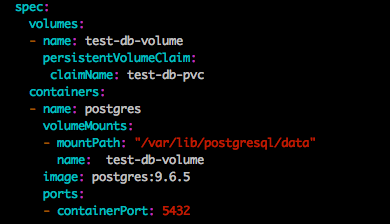- I've created the persistent volume (EBS 10G) and corresponding persistent volume claim first. But when I try to deploy the postgresql pods as below (yaml file) :
Receive the errors from pod:
initdb: directory "/var/lib/postgresql/data" exists but is not empty It contains a lost+found directory, perhaps due to it being a mount point. Using a mount point directly as the data directory is not recommended. Create a subdirectory under the mount point.
Why the pod can't use this path? I've tried the same tests on minikube. I didn't meet any problem.
- I tried to change volume mount directory path to "/var/lib/test/data", the pods can be running. I created a new table and some data on it, and then killed this pod. Kubernete created a new pod. But the new one didn't preserve the previous data and table.
So what's the way to correctly mount a postgresql volume using Aws EBS in Kubernete, which allows the recreated pods can reuse initial data base stored in EBS?

